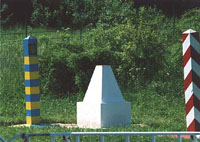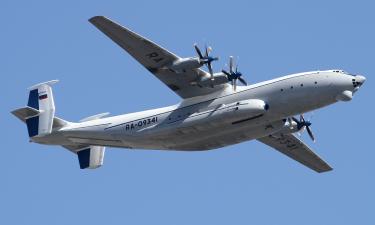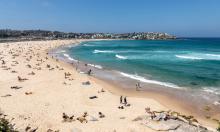Moldovan separatists to block traffic at Ukrainian border
Moldovan separatists refused entry Monday to 81 cargo trucks from Ukraine, as part of an ongoing protest to Ukrainian customs regulations that the separatist region says amount to political pressure. Ukraine imposed its new regulations on March 3 amid pressure from Moldova and the European Union, which is concerned about smuggling in the internationally unrecognized Trans-Dniester region. In response, the separatist region began blocking trucks and other cargo traffic headed across the border from Ukraine.

Trans-Dniester, which borders Ukraine, has run its own affairs after a 1992 war with Moldovan government forces that left about 1,500 people dead. The Russian-speaking enclave receives support from Moscow, which also condemned Ukraine's move as a blockade. An EU mission, deployed at the border to help strengthen security, said the new Ukrainian rules requiring Moldovan customs stamps on shipments from Trans-Dniester were implemented correctly.
Mission head Ferenc Banfi said it was Trans-Dniester that was blocking traffic. "Cargo traffic in transit from Ukraine through the Trans-Dniester region of Moldova is still blocked by the so-called Trans-Dniester authorities, except for several instances," Banfi said Monday in an e-mail response to The Associated Press. At one checkpoint, he said, 41 trucks were waiting to enter Trans-Dniester, 25 more were waiting in a parking zone at another crossing point and approximately 15 were stopped at a third site.
Banfi noted that on the other side, six trucks were barred from entering Ukraine because they did not have valid Moldovan customs stamps. Trans-Dniester authorities accuse Ukraine of tightening customs regulations as a way of putting pressure on the separatist province to make political concessions. Moldova is seeking to bring the separatist province back into the fold. The Trans-Dniester administration denies the charges of smuggling in its territory, saying Moldova was trying to tarnish its reputation.
Ukrainian President Viktor Yushchenko insisted Kiev was only attempting to curb illegal trade, and that requiring Moldovan customs stamps reflected Ukraine's position that Moldovan sovereignty must be respected. Officials from all sides have warned that the standoff could escalate. Ukraine's Foreign Ministry said it would not be pressured into backing down. Yushchenko, who has sought a bigger regional role for his country, also called for a new round of talks on Trans-Dniester.
Last year, Yushchenko proposed a plan that envisions keeping Trans-Dniester within Moldova but giving it broad autonomy. The plan was broadly welcomed, including by Russia, which maintains troops in the region. A Russian envoy who recently returned from Trans-Dniester suggested Monday that there could be a connection between the current crisis and the recent involvement of the United States and the European Union as observers at the talks.
"Chronologically, they coincide," Valery Kenyaikin, the Foreign Ministry's envoy for former Soviet republics' affairs, was quoted as saying by the Interfax news agency. He called the imposition of Ukraine's new customs regulations "a planned political action," and said that "not only are Moldova and Ukraine involved, but also, sad to say, the West," the ITAR-Tass news agency reported, reports the AP.
N.U.
Subscribe to Pravda.Ru Telegram channel, Facebook, RSS!


